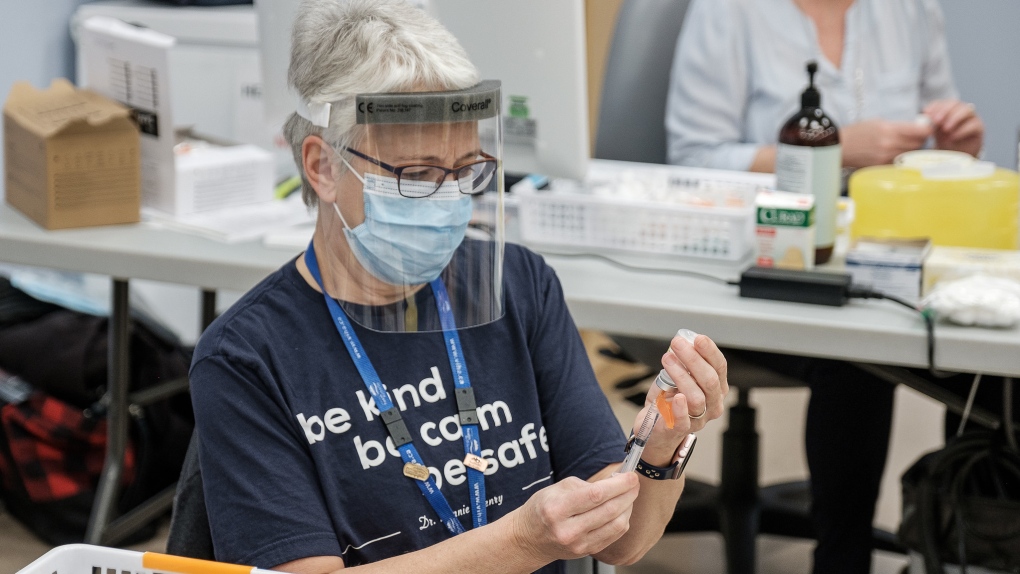3rd doses of COVID-19 vaccine may be rolling out for some B.C. residents this fall, top doctor says
 B.C.'s COVID-19 vaccine distribution began on Dec. 15, 2020. (Province of BC/Flickr)
B.C.'s COVID-19 vaccine distribution began on Dec. 15, 2020. (Province of BC/Flickr)
Health officials in B.C. are preparing for the possibility of a third COVID-19 vaccine dose being necessary for some residents, saying boosters may be on the way as early as this fall.
Dr. Bonnie Henry spoke about vaccine boosters and third shots during a news conference on modelling data Tuesday. In that presentation, Henry also revealed those who are unvaccinated are 12 times more likely to get COVID-19 and 34 times more likely to require hospitalization than those who are fully vaccinated.
Henry said health officials have been "following the data" on booster shots, adding that there are "two groups of people" they're focusing on.
One of those includes people with specific immune-compromising conditions, like blood cancer or those who have had a solid-organ transplant. Henry explained those individuals "don't necessarily develop a response after two doses" of COVID-19 vaccine, but a third dose might increase the probability of them having a good immune response.
"Operationally we're putting together the plans to be able to provide that third dose to those group of people and I expect that will happen in the next week or so," Henry said.
The other group includes residents of long-term care facilities.
"It's a little bit different across the country and those are also data that we've been watching very carefully," Henry said. "So far we are not seeing a diminution of protection across the board of long-term care."
Henry explained most long-term care residents had a longer interval between their two shots, which she said gives a "strong, longer-lasting protection."
"We need to determine what is the optimal interval," she said, adding that though it's still a bit speculative, it could be about six to eight months.
"That would put us for most people in long-term care somewhere around October. So we're gearing up to be able to provide a third dose around that period of time and we'd be looking at providing influenza immunization around the same time."
For other B.C. residents, Henry said officials are considering whether everyone needs a third dose, reiterating that a longer interval between doses gives a better immune response.
"We want to make sure that we know the appropriate timing and whether it's needed. Countries like the U.S. and Israel, they stuck to the very narrow window of time for the most part and so have been focusing on booster doses," she said.
"The data that we're seeing right now doesn't show that we need a booster dose yet. It may be sometime in the new year for the average person."
CTVNews.ca Top Stories

Trudeau's 2024: Did the PM become less popular this year?
Justin Trudeau’s numbers have been relatively steady this calendar year, but they've also been at their worst, according to tracking data from CTV News pollster Nik Nanos.
Back on air: John Vennavally-Rao on reclaiming his career while living with cancer
'In February, there was a time when I thought my career as a TV reporter was over,' CTV News reporter and anchor John Vennavally-Rao writes.
The winter solstice is here, the Northern Hemisphere's darkest day
The winter solstice is Saturday, bringing the shortest day and longest night of the year to the Northern Hemisphere — ideal conditions for holiday lights and warm blankets.
What we know about the suspect behind the German Christmas market attack
Germany on Saturday was still in shock and struggling to understand the suspect behind the attack in the city of Magdeburg.
Poilievre writes to GG calling for House recall, confidence vote after Singh declares he's ready to bring Liberals down
Conservative Leader Pierre Poilievre has written to Gov. Gen. Mary Simon, imploring her to 'use your authority to inform the prime minister that he must' recall the House of Commons so a non-confidence vote can be held. This move comes in light of NDP Leader Jagmeet Singh publishing a letter stating his caucus 'will vote to bring this government down' sometime in 2025.
Overheated immigration system needed 'discipline' infusion: minister
An 'overheated' immigration system that admitted record numbers of newcomers to the country has harmed Canada's decades-old consensus on the benefits of immigration, Immigration Minister Marc Miller said, as he reflected on the changes in his department in a year-end interview.
School custodian stages surprise for Kitchener, Ont. students ahead of holiday break
He’s no Elf on the Shelf, but maybe closer to Ward of the Board.
Kelly Clarkson's subtle yet satisfying message to anyone single this Christmas
The singer and daytime-talk show host released a fireside video to accompany her 2021 holiday album, “When Christmas Comes Around” that she dubbed, “When Christmas Comes Around…Again.
Pope Francis reprimands Vatican staff for gossiping in annual Christmas message
Pope Francis told Vatican bureaucrats on Saturday to stop speaking ill of one another, as he once again used his annual Christmas greetings to admonish the backstabbing and gossiping among his closest collaborators.

































